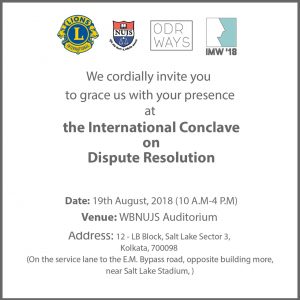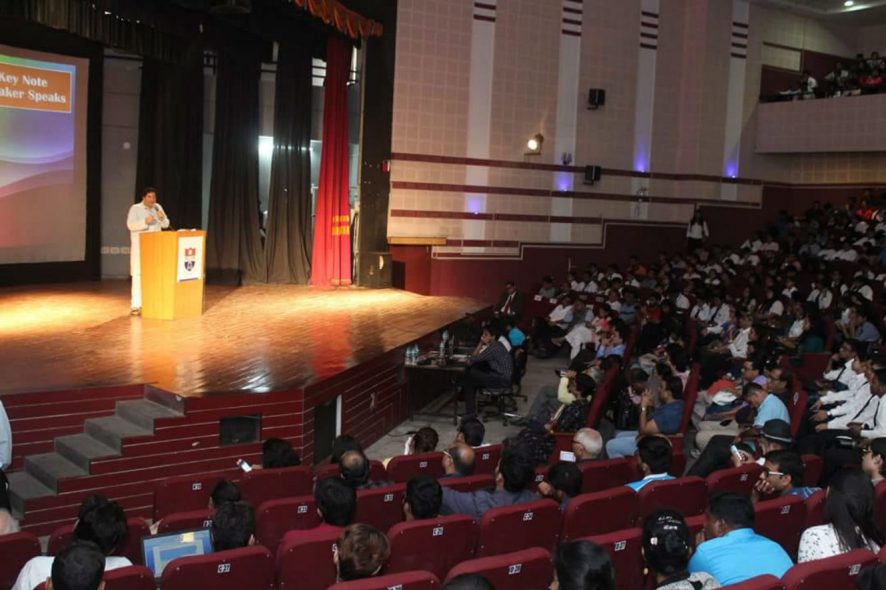|
Greetings!
Indian Mediation Week (IMW) in collaboration with Lions Clubs International is organizing the “International Conclave on Conflict Resolution” on 19th August 2018, at West Bengal National University of Juridical Sciences, Kolkata. Indian Mediation Week is officially supported by Ministry of Law and Justice, Government of India, Indian Institute of Corporate Affairs (IICA) and Supreme Court Mediation and Conciliation Project Committee (MCPC).
 The event will be attended by Law Minister, Judges of Kolkata High Court, Senior Advocates etc. More than 1200 law students from across the country have registered for this conference.
Varun Gandhi, Member of Parliament for Lok Sabha, will be the keynote speaker of the event. Other Speakers for the events are Mr. Moloy Ghatak, Law Minister, Retd. Justice Chandrasekhar, Mr. Bikash Ranjan Bhattacharya(ex Advocate General of Tripura), Mr. Utpal Chatterjee( Distinguished Journalist), Mr. Jishnu Choudhary, (Addl. Government Pleader), Mr. Ajoy Gupta, Member Secretary, State Legal Services Authority, WB, Mr. Avik Ghatak, In Junior Panel, Calcutta HC, Mr. Ritzu Ghoshal, Senior Lawyer, Calcutta HC, Mr. Manik Chakraborty, Director, Amity University among other notable speakers. We are also keen in having Justice Joymala Bagchi, Justice Protik Prakash Banerjee, Justice Soumen Sen.
The main aim of the conclave is to equip participants with the basics of theoretical and practical aspects of Alternative Dispute Resolution (ADR) procedures, including sessions on Arbitration, Mediation, Legal Aid, etc. Eminent Jurists, Lawyers, Diplomats, Academicians and Social activist will be taking sessions on the various sub-themes of Alternative Dispute Resolution.
|
The Chief Guest Justice Soumen Sen of the Kolkata High Court and the key-note speaker Varun Gandhi MP laid the foundation for the programme in an innovative way by pouring water to a potted plant and thereby delivering the message of preserving the environment.
The Conclave begins with the Chief Guest’s address. Justice Sen spoke about the various kinds of conflicts pending in the courts and the necessity of Alternate Dispute Resolution mechanisms in resolving many of them, like commercial and family disputes. He gave fascinating instances of disputes which he has come across in his vast experience with the legal system wherein protracted and complex legal disputes were avoided due to mediation.
Mr. Kishan Poddar from the Lion’s Club was the next speaker to address the audience. He spoke about the contributions of Lion’s Club towards the field of Conflict Resolution. LIONS- Liberty Intelligence Our Nation’s Safety have worked for the welfare of the people throughout the globe ever since its inception in 1917 post World War 1. LIONS have always served as a bridge between the haves and have not’s which, according to him, are the social disparities which causes conflict. They have always worked by their motto “We Serve” in various fields like Women empowerment, helping the poor etc and reminded everyone of the LIONS phrase “Where there is a need, there is a LION.”
Mr. Pranjal Sinha, CEO of ODRWays and chief co-ordinator of IMW next took to the stage to a uproarious applause. He spoke about his journey through the field of mediation which started with a lecture on “Access to Justice” he attended while he was 19 years old. The idea of ODRWays as a method to promote mediation through technology has led the team to great heights within 3 years after humble beginnings. He spoke about Indian Mediation Week which is a student-driven movement started to spread awareness about mediation that started from a drive within NUJS and has covered 102 cities as of now! He spoke about the Business Mediation Expos planned in the month of December, across the nation to spread awareness on mediation amongst various stakeholders. He ended his speech by delivering a heart warming message on the widespread effects of mediation which was acknowledged by a large round of standing ovation.
Ms. Saira Shah Halim the famous Social activist, Author and Corporate trainer gave one of the most awaited speeches of the conclave, on conflicts regarding personal laws. She spoke about the history of social activism in India amidst its immense diversity. She highlighted the role of the constitution and laws in safeguarding this diversity. This brought her to the value of constructive dialogue and debate on various disputes in the society, drawing from her experience during the triple talaq case. She ended on an optimistic note about the progress which India is making in the area of social justice.
The auditorium stood up to welcome the keynote speaker for the conclave, Mr. Feroze Varun Gandhi, MP. The overarching theme of his speech was India’s journey into the post modern era. He made some truly eye opening remarks about inequality faced by the nation and the world and such inequality being the root cause of “conflict”. Mr Gandhi specifically focused on the inequality prevalent in the field of education in India and the perpetuation of privilege through the educational sector. He proposed some extremely interesting solutions to bridge this inequality, the student externship program and the government subsidization of private education rather direct government operation of schools to provide quality education as widely as possible and the usage of technology to make education accessible in the remotest areas of the country. Thereafter, he moved on to the changing job market and the necessity of innovation and wise and long term investment in order to keep up with the same. He emphasized on the acute need of rejuvenation of research and development sector in India. In the third leg of his speech Mr. Gandhi discussed some of the most pertinent challenges faced in the field of healthcare in India and keeping with the grave yet optimistic tone of his speech, proposed solutions involving the usage of technology to link the patients to the health care providers. He ended the address with truly heartening accounts of individuals and civil society projects which have bettered the lives of thousands, if not millions, of people. With a speech replete with as many inspiring anecdotes as shocking statistics, Mr.Varun Gandhi left the audience not just more enlightened but also with a serious case of goose bumps. Many in the audience must have been immensely encouraged to in becoming a spoke of the wheel of change to make the country and the world a better place to live in. “Democracy is not where everyone has just one vote but one where everyone has one voice.”
Mr. Gandhi subsequently fielded a variety of questions from the audience after his address, on a wide range of issues like inequality , diversity, disinvestment in India etc.
Mr. Varun Gandhi facilitated the best student of the year and the star students for their contribution to alternate dispute resolution. Akshetha Ashok of NUJS was declared the best student while the star student awards were won by Anushka Mitra from Symbiosis University, Hyderabad and Dhubhrojyoti Bose Jogesh Chandra Chowdhry Law College.
Afterwards, the conference went for a lunch break.
The first speaker post lunch was Ms. Debaroopa Bhattacharyya, educationist, language consultant, social entrepreneur and founder director of English Gurukul. Her topic was about the National Conflicts in North-Eastern India. She spoke about her experiences as a ‘Bongal’ in Assam as an outsider or a foreigner among the natives. She gave the audience a brief narrative about the multi ethnicity of Assam and compared the ethnography of Assam throughout the years. She briefly talked about the NRC debacle and quickly moved on to the story about the Assam movement and the policy taken by the Centre during the 80’s regarding the problem caused by illegal migrants from Bangladesh. She spoke about various instances where Assamese cultural symbols have been alienated by the Indian mainstream. After briefing the audience about some problems, she moved to the main part of her talk where she emphasized on ‘Peace not being the absence of conflict but the ability to handle conflict.’
Adv. Saswata Gopal, senior lawyer and Public Prosecutor of West Bengal, took to the stage next and spoke on the topic ‘Gender Based conflict’. He started his talk by illustrating on how gender based discrimination is perpetrated from the families itself and how it is resonated in various sections of the society. He talked about how proper implementation of laws will only be possible if our mindset changes regarding gender relations. As a future citizen of India, we have to look upon ourselves and analyze the situation in the society regarding this problem. He ended his speech by making a heartfelt plea to the audience to look upon themselves and understand its duties for enabling progress in terms of gender relations.
Dr. Sandeepa Bhatt, Professor of WBNUJS, took to the stage to speak about ‘WTO Dispute Settlement; Concerns to Overcome’. He spoke about the circumstance that led to the formation of WTO and thereby Dispute Settlement Understanding (DSU), the conflict resolution mechanism of WTO. He talked about four major issues related to the WTO dispute resolution mechanism which are- the locus standi, the amicus curiae briefs, judicial economy and the standard of review as these are not explicitly discussed in the DSU. He talked about the major cases related to these issues and how in actual practice, the WTO have deferred from their founding principles.
The next session was led by Dr. Aman Hingorani, senior lawyer and Supreme Court Mediatior on ‘Alternate Dispute Resolution’. He started his talk by giving a brief introduction on the three forms of ADR, Arbitration, Mediation and Negotiation. He spoke about the skills required in a law student if he/she aspires to become a mediator or arbitrator or negotiator. He enlightened the audience on how different skills are required for all three mechanisms and what all should a lawyer expect and look for during a round of Alternate Dispute Resolution. He also spoke about the gulf between academic and practical knowledge that has been a drawback of the old-school teaching methods and how it can be improved.
Afterwards, he conducted a Q&A session with the students and cleared many of their queries regarding ADR.
The CEO of SREI, Ashok Pareek, then spoke of corporate conflicts. He explained at length how a corporate culture premised on timelines, centralized hierarchies, and asymmetric information inherently yields conflicts. It then became clearer that alternate dispute redressal represents a shift in corporate culture: it indicates a preference for discourse and discussion and of opening avenues and lines of communication. He concluded on a warm invitation to look deeper, to be patient, and open ones heart and mind.
To open the module on cyber conflicts Dr. Shambu Prasad Chakraborty discussed cyber conflicts. He began with some notes on data security concerns, and highlighted avenues for data theft and misuse.
Mr. Avik Ghatak, Advocate, Calcutta High Court, took the audience to the alternate redressal of International law conflicts. He zeroed in on the topic of refugees and emphasized the temporally aggravating circumstances in which refugees have become a concern. Throughout the brief account of world history he gave us, he covered the changing faces of refugee movements, from statehood (Israel) to posing a challenge to Statehood (Palestine), to internal displacement, and political polarization (the NRC issue). He then laid down International law principles on the treatment of refugees, from accepted norms to modes of action.
The Paper presentations followed the talks. The first paper was presented by Ms. Advitya, Dept. of Law, University of Calcutta on the topic ‘Conflict Resolution in Environmental Governance’. It was followed by Ms. Priyadarshini from St. Xavier’s University, Kolkata. Her topic was on ‘Gender relations and Conflict Resolution’. And the last paper was presented by Ms. Ritika from Amity University on the topic ‘Mediation as an Appropriate Dispute Resolution’.
Finally, the vote of thanks was delivered by Ms. Vanitha Pattnaik, faculty of WBNUJS and faculty advisor of IMW. With that, the International Conclave on Conflict Resolution wrapped up






